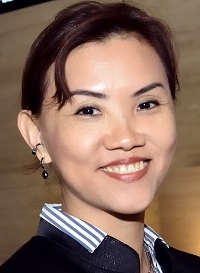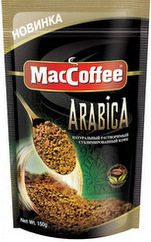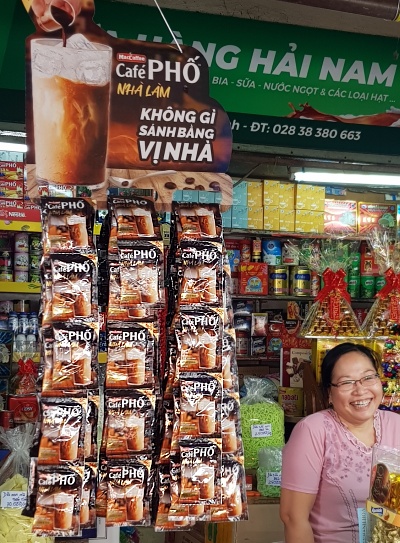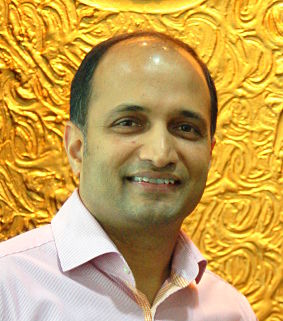 This article by Jennifer Tan appeared in SGX's kopi-C: the Company brew series, and is republished with permission.
This article by Jennifer Tan appeared in SGX's kopi-C: the Company brew series, and is republished with permission.
|
Food Empire CEO Sudeep Nair’s fortuitous, and somewhat unexpected, career journey – one that spanned three decades – first began with a switch from coding to computers, then to coffee. A software programmer by training, Nair realised early on that this role wasn’t his cup of tea, and turned to computer equipment sales.
“Our business focused on exporting electronics goods like disk drives, printers and PCs to Eastern Europe. As it was a pure trading model, operating conditions could be brutal,” Nair recalled. “It happened that some our distributor contacts were interested in sampling new beverage products, so we brought over some sachets of 3-in-1 coffee mix. After that, trial orders for the coffee mix took off.” |

The pair knew the writing was on the wall for consumer electronics distribution, a business plagued by stiff competition and razor-thin margins.
“We didn’t want to handle someone else’s brands – we wanted to create something of our own. So after our first test product – a 3-in-1 instant coffee mix – was well-accepted by the market, we knew we had struck gold.”
In 1995, with 40 employees in a small office in Moscow, the MacCoffee brand – which opened up a new world of aromatic flavours for Russian consumers – was born.
For Nair, it was more of a hardship posting. “I was hesitant to move to Moscow,” he admitted.
After the Berlin Wall collapsed in 1989 and the Soviet Union dissolved in 1991, Russia and Eastern Europe was in disarray. “Other colleagues who came over stayed up to a month before quitting, and there was no one else left to do the job.”
Another hurdle was educating the local, predominantly tea-drinking market. “At that time, no one knew much about instant coffee. Thankfully, the locals were game to try new products.”
As Eastern Europe began its transition to a market economy, foreign investments were warmly welcomed. In particular, instant food and beverage products were seen as a novelty.
| A Bumpy Road |
 By 1997, Nair, as Food Empire’s Country Head, had succeeded in laying the foundation for a multi-million-dollar MacCoffee brand, one that took Moscow by storm. “That was our first high,” he added.
By 1997, Nair, as Food Empire’s Country Head, had succeeded in laying the foundation for a multi-million-dollar MacCoffee brand, one that took Moscow by storm. “That was our first high,” he added.
However, the low wasn’t far behind. In the summer of the following year, the Russian Financial Crisis struck – oil prices plummeted, bringing the economy down in one fell swoop. The government subsequently devalued the currency and defaulted on its debts.
“That was my first experience managing a crisis. It was a very bad time for everyone – the currency went from 6 roubles to 24 roubles to the dollar, and chaos reigned.”
Fortunately, Russia bounced back in the next two years, thanks to international financial aid and a sharp rebound in oil prices. “Food Empire returned to its growth path from 2000, and that year, we successfully listed on SGX,” recalled Nair, who was appointed Executive Director in 2005.
Between 2000 and 2005, the Group expanded rapidly, spreading its wings to the Commonwealth of Independent States (CIS), Ukraine and Kazakhstan.
The next trough, however, was just around the corner. This time, it was the 2009 Global Financial Crisis. By then, the realisation that Food Empire was too dependent on a single geographical market had hit home.
|
Rare success in Vietnam |
|
|
“Our operations were too concentrated in Russia and the CIS, and we saw the urgency of diversifying our revenues out of this region,” he said.
“While it’s easy to talk about diversification, it’s tough to execute. We experimented with various business models, but there were many challenges, and we didn’t make much headway.”
In 2012, Nair was promoted to Chief Executive Officer. Renewing his focus on developing Food Empire’s diversification strategy, he decided to adopt a multi-pronged approach in ASEAN. Myanmar, Vietnam and the Philippines were identified as target markets.
“The ASEAN region has a population of more than 600 million, and is stable politically as well as economically. We had tried to penetrate these three markets through an export and trading model, but failed, because there were too many local players and competition was intense.”
| Growing Asia Presence |
Instead, Food Empire began investing in people and resources to build its proprietary brands in each geography. Next, it began vertically integrating operations by setting up manufacturing plants in markets like India and Malaysia for key ingredients, such as instant coffee, non-dairy creamer, and later, potato crisps.
“Of the three markets we selected, we achieved clear success in one – Vietnam. We bled for three years and was on the verge of shutting down, but finally, we turned it around,” Nair said.
Over the last five years, Food Empire has grown its Vietnam sales to S$50 million from S$2 million, and secured more than 10% share of the domestic market for instant coffee. “No Singapore company has done that so far in the branded instant coffee industry,” he added.
The Group continues to tweak its blueprint for the Philippines. “Our entry strategy wasn’t quite right, and we’re trying again with a new team and a new direction.”
Myanmar, however, was a failure. “We pulled out of that market last year, largely because of its unstable currency, which has been on the decline. None of the F&B brands in Myanmar have been able to raise prices, and as a result, everyone is grappling with huge margin compression.”
At the same time, Nair kept his pulse on merger and acquisition opportunities. “It took us 15 years to hit revenues of US$200 million through organic growth. We can expedite our next growth phase through M&As.”
But due to stringent criteria, Food Empire has yet to conclude a deal. “We’re seeking a partner or target with a successful business model, preferably in Asia or Western Europe, as we want to diversify out of the Eastern European region. But we haven’t found a candidate who is a good fit.”
One new and immediate challenge is the coronavirus pandemic. “We’ve not seen a direct hit to our supply chain from COVID-19, but consumer demand has been affected as most major economies have slowed down."
Nonetheless, the Group’s strong balance sheet should provide a buffer, he added. For the year ended 31 December 2019, revenue rose 1.5% year-on-year to US$288.6 million, while net attributable profit jumped 44.9% to US$25.7 million. Cash and cash equivalents rose 29.6% to US$54.7 million as at end-2019.
Today, Food Empire Holdings Ltd produces a wide variety of instant beverages such as regular and flavoured coffee mixes and cappuccinos, chocolate drinks and flavoured fruit teas. It also markets instant breakfast cereal, assorted frozen foods and snack items. Raw ingredients, like instant coffee and non-dairy creamer, are sold to other food manufacturers under its B2B arm.
Proprietary brands include Petrovskaya Sloboda – a domestic coffee brand acquired in 2007, Café PHO, Klassno, CafeRite, NutriRite, Hillway, Hyson, OrienBites and Kracks. Its flagship MacCoffee brand has consistently been ranked as the leading 3-in-1 instant coffee brand in the Group’s core markets of Russia, Ukraine and Kazakhstan.
| Coming Into Its Own |
 In Vietnam, Cafe Pho and other Food Empire products are mainly sold in provision shops.
In Vietnam, Cafe Pho and other Food Empire products are mainly sold in provision shops.
NextInsight file photo.The medium-term outlook, meanwhile, remains bright. “We’ve changed Food Empire’s operating model by diversifying our revenue base into Asia, so we’ll have more than one region driving growth,” Nair said.
In 2011, the Group derived only US$25 million in revenue from markets outside Ukraine and the CIS, including Russia. By 2019, this figure had surged to US$108 million, thanks to its expanding Asian operations.
“We’ve built a more solid business by reducing our geographical concentration on Eastern Europe to 63% from 80% previously,” he added.
The Group’s vertically integrated operations – ranging from manufacturing to sales and distribution – also provides added stability.
After nearly 30 years, Food Empire has finally come into its own, Nair noted. “We’re a mid-sized company, not a billion-dollar MNC – it’s been tough to build strong, proprietary brands in each market given our limited resources. But we’ve succeeded, despite the many bumps along the way.”
Looking back on the Group’s milestones, Nair feels a deep satisfaction. “When I was in my mid-20s, financial success was the main goal. Now, in the last 10 years, seeing how Food Empire has evolved – from 40 staff when I joined to more than 3,000 now – it’s about enriching people’s lives, from employees to shareholders and consumers, through the brands and communities we build.”
The 50-year-old, who drinks at least three to four cups of coffee a day, prefers Colombian, Guatemalan and Kenyan beans. His source of inspiration is rooted in a version of the David and Goliath story, where small and medium enterprises are able to hold their own against multinational corporations in the same industry segment.
“I tell my staff – don’t look at the large MNCs out there, focus instead on the small, local businesses which have made their mark.”
His biggest muse, however, is his wife Irina, whom he met in 1995 after moving to Moscow. “At that time, she was in charge of administration and marketing in the office. She was a good source of insight into local consumer trends, and played an integral part in formulating the advertising strategy that eventually turned MacCoffee into a well-known brand in Russia.”
For his 21-year-old daughter Anastasia, he has this advice: Do what you love. “I always tell her, whatever you choose to become – a painter, entrepreneur or lawyer – pursue it with all you have.”
“Only with determination and passion can you create an impact in people’s lives.”
|
Food Empire Mainboard-listed Food Empire is a global branding and manufacturing company in the food and beverage sector. Its products are exported to over 50 countries, such as Russia, Ukraine, Kazakhstan, Central Asia, China, Indochina, the Middle East, Mongolia and the US. The Group has 24 offices (representative and liaison) worldwide, and operates seven facilities in Malaysia, India, Vietnam, Russia and Ukraine. Products include regular and flavoured coffee mixes and cappuccinos, chocolate drinks and flavoured fruit teas. It also markets instant breakfast cereal, potato crisps and assorted frozen convenience foods. Food Empire’s strength lies in its proprietary brands that include Petrovskaya Sloboda, Klassno, Hyson, OrienBites and Kracks. MacCoffee – the Group’s flagship label – has been consistently ranked as the leading 3-in-1 instant coffee brand in its core markets of Russia, Ukraine and Kazakhstan. The company website is: www.foodempire.com. Click here for the company's StockFacts page. For the three months and full year ended 31 December 2019 financial results, click here |








